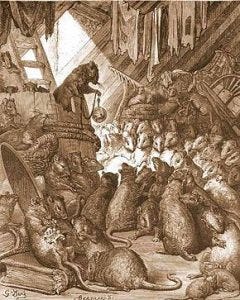A Hero
A way to gain influence is to accept personal risk for the benefit of a group. I.e. to become a hero.
Groups use this mechanism to solve a paradox: an individual can act in the interest of a group at one’s detriment. On the other hand, inaction leads to a loss to every member of that group.

Heros are usually associated with mythical characters fighting monsters. In practice, groups mimic this pattern by rewarding individuals with influence1 to incentivize them to take risks. However, these risks can include championing one side in forming conflict with other groups. Thus, a way to gain influence is to take responsibility for a conflict with an opposing group2.
This can be as simple as publicly expressing an opinion in today's world.
Of course, these risks include many personal consequences, such as losses of business opportunity, public conflict, a backlash against one’s project, etc. Psychologically taxing ad hominem attacks frequently manifest in this environment.
watching someone get dragged on Twitter for an opinion I secretly agree with pic.twitter.com/j8udY5pubd
— Alex Griswold (@HashtagGriswold) April 26, 2018
Heavy influence can come to those willing to champion one group in an attack or defense against others. A time-tested strategy is to attack individuals expressing certain ideas instead of the ideas themselves. This represents a significant risk to an individual hero, but the reward can be massive in the form of support from other members of his or her group3.
Groups face risks in democratic societies. Less powerful groups are often marginalized by more powerful ones. The hero effect is an important mechanism because vulnerable groups get easily marginalized without it.
Groups need individuals to express their views, but more importantly, to articulate a strong position when confronted by other voices. This way, society can incorporate broader ideas in establishing a consensus.
Thanks to Tre Dudman, and Jason Civalleri for reading the early draft.
This thinking has also been published as a Twitter thread.
The rewards take the form of attention and/or money, which are two quantifiable metrics of influence; https://maciek.blog/what-is-influence
David and Goliath is a biblical example of this dynamic. After defeating Goliath, David becomes the king of the Israelites. Source: https://www.biblegateway.com/passage/?search=1+Samuel+17&version=NIRV
Jordan Peterson's story is a good example of this. He voiced views held by a large but silent group. A more powerful group silenced them by enforcing a social penalty. Peterson incurred the cost. As a result, he was rewarded by the group he took the risk for. In this case, the support came in the form of influence, defined as attention and financial resources. In this video, Peterson explains how the more he gets protested, the more support he receives through Patreon:
